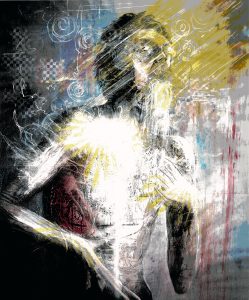An essay by Skioring Lamb, as provided by Boris Glikman
Art by Luke Spooner
It was perhaps inevitable that some bright spark in the Research and Development Department of a certain internationally famous company would, during a brainstorming session, come up with the idea of a beverage consisting solely of pure light. The essential concept behind it was simplicity itself: why, in these modern, fast-paced times, go through the lengthy and convoluted process of needing the sun’s light to be photosynthesised by plants into chemical energy, which then has to be converted into carbohydrate molecules, which we then have to consume and digest in order for us to finally incorporate the energy from the sun into our systems? Why not bypass all the intervening stages and just capture, bottle, and imbibe the sunlight energy directly?
Management loved the proposal and supported its realisation by any means possible. Thus, less than a year after the go-ahead was given, the product appeared in the shops: a soothing, delightful elixir of natural sunshine, free of any preservatives, added sugar, or artificial flavours.
The drink provided an instant energy boost, sating hunger without any necessity for digestion, and immediately quenched thirst and made one feel warm all over. And, of course, it was suitable for all types of diets, including but not limited to kosher, halal, vegetarian, vegan, raw vegan, gluten-intolerant, and fruitarian. No one could take any issue with it, for it was pure light straight from the sun. And, fortuitously, it was also very suitable for those dieting, for according to the famous E = mc^2 equation, even a tiny amount of mass released a tremendous amount of energy, and thus one could quaff great quantities of this potation with hardly any weight gain.
Amazingly enough, apart from satisfying the most basic physical needs (food, water, warmth) in the hierarchy of needs, this beverage also enabled the consumer, and this was a completely unforeseen consequence, to become instantly spiritually enlightened once they drank it and thus fulfil the highest need in the hierarchy of needs–the yearning for self-actualisation. (Perhaps it should not have been so unexpected, for, by ingesting light, one, ipso facto, became illuminated within, which is exactly what enlightenment is, and also as the very morphological structure of the word “enlightenment” indicated its intimate connection to light.)
This serendipitous effect was perfect for contemporary society, for given that the online world now provided instant information, instant communication, instant entertainment, and instant gratification of needs and desires, it was only natural there would also be a great demand for instant self-realisation. And with this product, one no longer had to spend countless hours meditating and repeating the mantra, or sit at the feet of a guru, or clamber up the Himalayan mountains in search of monasteries. Instead, there was the convenience of immediate spiritual awakening in a bottle, accessible to all.
The advertising campaign was built around the slogans “Instant EnLIGHTenment™ in a Bottle!”, “Fast Food for Body and Soul!”, and “Let the Light DeLIGHT You!”. For once, reality corresponded exactly to the promotional claims, as it truly was a unique kind of an invention, the likes of which had never been seen before.
And so, as was to be expected, everyone flocked to buy the new drink, for, apart from its obvious appeal to the general public, its attraction was also irresistible to a diverse range of people with specific needs, such as athletic types looking for an immediate energy fix, spiritual seekers looking for the truth about themselves and the Universe, and weight-conscious dieters, who immediately added it to their fastidious regimens. Of course children loved it too, given its novelty value and almost-magical properties.
To read the rest of this story, check out the Mad Scientist Journal: Spring 2019 collection.
Bio of Skioring Lamb
I have awoken from the nightmare now, but it has left its permanent scars on me. I can not see, I can not move. I have sacrificed it all on the altar of the Sun, for I, like so many others, stared at the brightest fire in the sky and, oh, what grim irony, have turned into something resembling an ice statue. What we thought was Utopia instead turned into its flawed, grotesque reflection.
Boris Glikman is a writer, poet, and philosopher from Melbourne, Australia. The biggest influences on his writing are dreams, Kafka, and Borges. His stories, poems, and non-fiction articles have been published in various online and print publications, as well as being featured on national radio and other radio programs.
Luke Spooner, a.k.a. ‘Carrion House,’ currently lives and works in the South of England. Having recently graduated from the University of Portsmouth with a first class degree, he is now a full time illustrator for just about any project that piques his interest. Despite regular forays into children’s books and fairy tales, his true love lies in anything macabre, melancholy, or dark in nature and essence. He believes that the job of putting someone else’s words into a visual form, to accompany and support their text, is a massive responsibility, as well as being something he truly treasures. You can visit his web site at www.carrionhouse.com.
“Fiction: The Light of Their Lives” is © 2019 Boris Glikman
Art accompanying story is © 2019 Luke Spooner


Thank you for sharing my story – much appreciated!